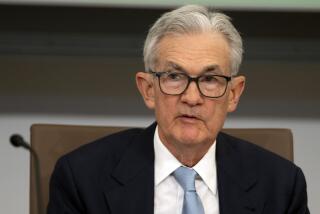Bernanke says Obama, Congress must pull back from ‘fiscal cliff’
WASHINGTON -- Federal Reserve Chairman Ben S. Bernanke said Tuesday that President Obama and Congress must shield the fragile economy from the full brunt of the so-called fiscal cliff or risk another recession just as the recovery is taking hold.
Speaking at the New York Economic Club, Bernanke warned that the Fed doesn’t have the tools left to offset the one-two punch of significantly higher taxes and sharply reduced government spending set to begin in January.
“Coming together to find fiscal solutions will not be easy, but the stakes are high,” Bernanke said.
The housing market recently has shown “some clear signs of improvement,” but the economic recovery still faces significant head winds. Among those is U.S. fiscal policy, which he said “may intensify in force in coming quarters.”
Quiz: How much do you know about the ‘fiscal cliff’?
“The Congress and the administration will need to protect the economy from the full brunt of the severe fiscal tightening at the beginning of next year that is built into current law -- the so-called fiscal cliff,” he said.
“The realization of all of the automatic tax increases and spending cuts that make up the fiscal cliff, absent offsetting changes, would pose a substantial threat to the recovery,” Bernanke said.
He noted projections from the Congressional Budget Office and many economists are that such “a fiscal shock of that size would send the economy toppling back into recession.”
If the White House and Congress can’t reach a deal to avoid the fiscal cliff, the Fed won’t be able to prevent another recession because it has exhausted just about all its monetary measures to try to boost the economy, Bernanke said.
The Fed is in the midst of a third round of stimulative bond buying, known as quantitative easing. But the central bank has kept short-term interest rates near zero since late 2008 -- a level it has said will continue until at least mid-2015 -- and there is not much else the Fed can do.
Any deficit reduction deal probably would involve higher taxes and reduced government spending that would be a drag on economic growth next year, Bernanke said. But that’s better than the alternative.
“My advice on this is sort of ‘do no harm’ and in that respect what I’m most concerned about … is the full force of the fiscal cliff,” Bernanke said.
“The ability of the Fed to offset head winds is not infinite,” he continued. “In the worst-case scenario where the economy goes off the largest fiscal cliff … I don’t think the Fed has the tools to offset that.”
A deal to avoid the fiscal cliff and start reducing the soaring national debt will help ease some of the uncertainty by businesses that has been a drag on growth.
Bernanke said he could not quantify how much fiscal cliff concerns were harming growth, but said the effect of uncertainty was “probably significant.”
He noted that his doctoral dissertation was on the effects of economic uncertainty on investment spending.
“I concluded it’s not a good thing and they gave me a PhD for that,” he said to laughter from the audience.
“It is certainly true that businesses are very concerned about uncertainty and that seems to be a drag on their investment spending and hiring decisions,” Bernanke said.
The European debt crisis also is a source of uncertainty. But Bernanke said that avoiding the fiscal cliff would reduce uncertainty and potentially provide a big boost to the U.S. recovery because there would be “a greater level of security about where the country is going”
ALSO:
Fed, worried about job growth, launches new stimulus
Consumer default rates rose in October for first time this year
Feds charge former hedge fund manager in big insider-trading case
Follow Jim Puzzanghera on Twitter and Google+.
More to Read
Inside the business of entertainment
The Wide Shot brings you news, analysis and insights on everything from streaming wars to production — and what it all means for the future.
You may occasionally receive promotional content from the Los Angeles Times.











